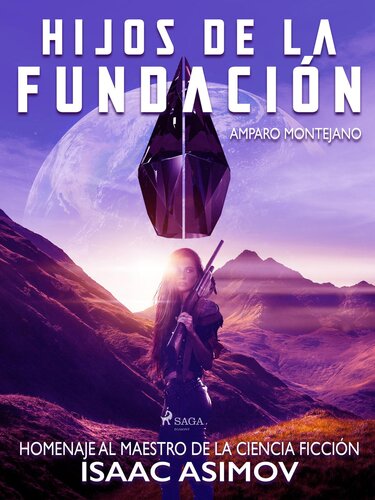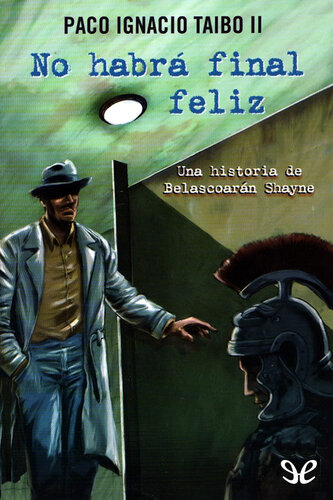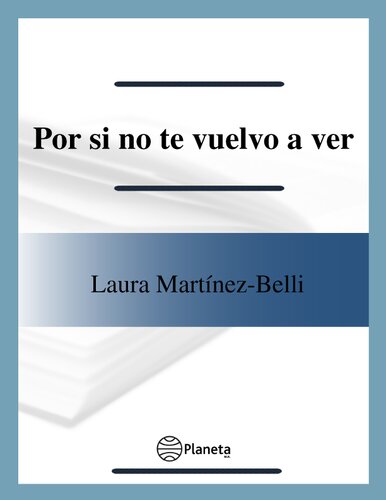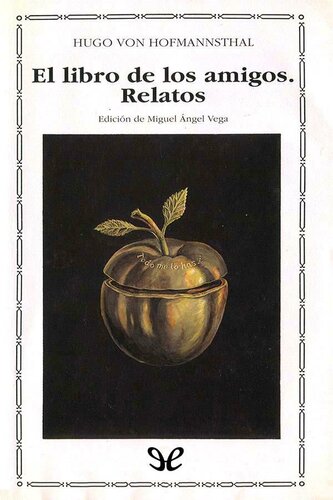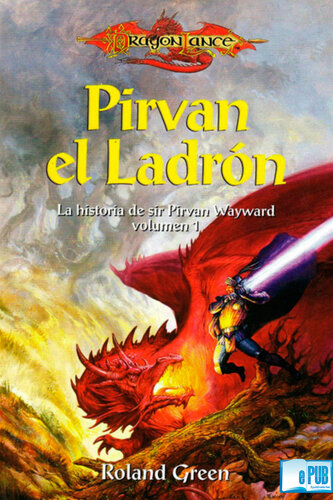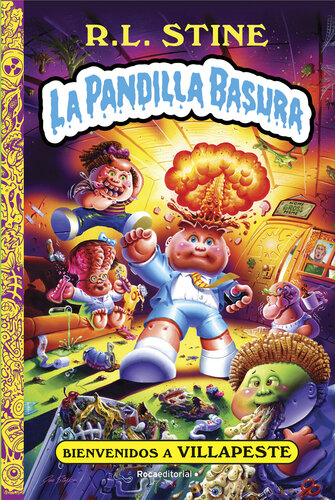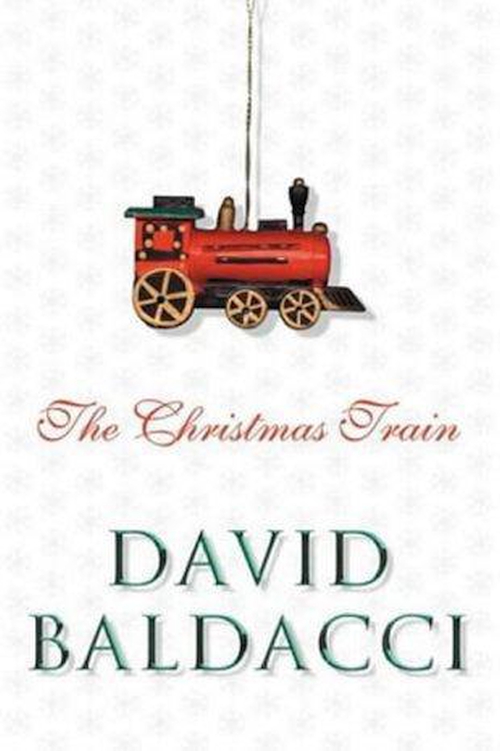oleebook.com
La guerra de las salamandras de Capek, Karel
de Capek, Karel - Género: Ficcion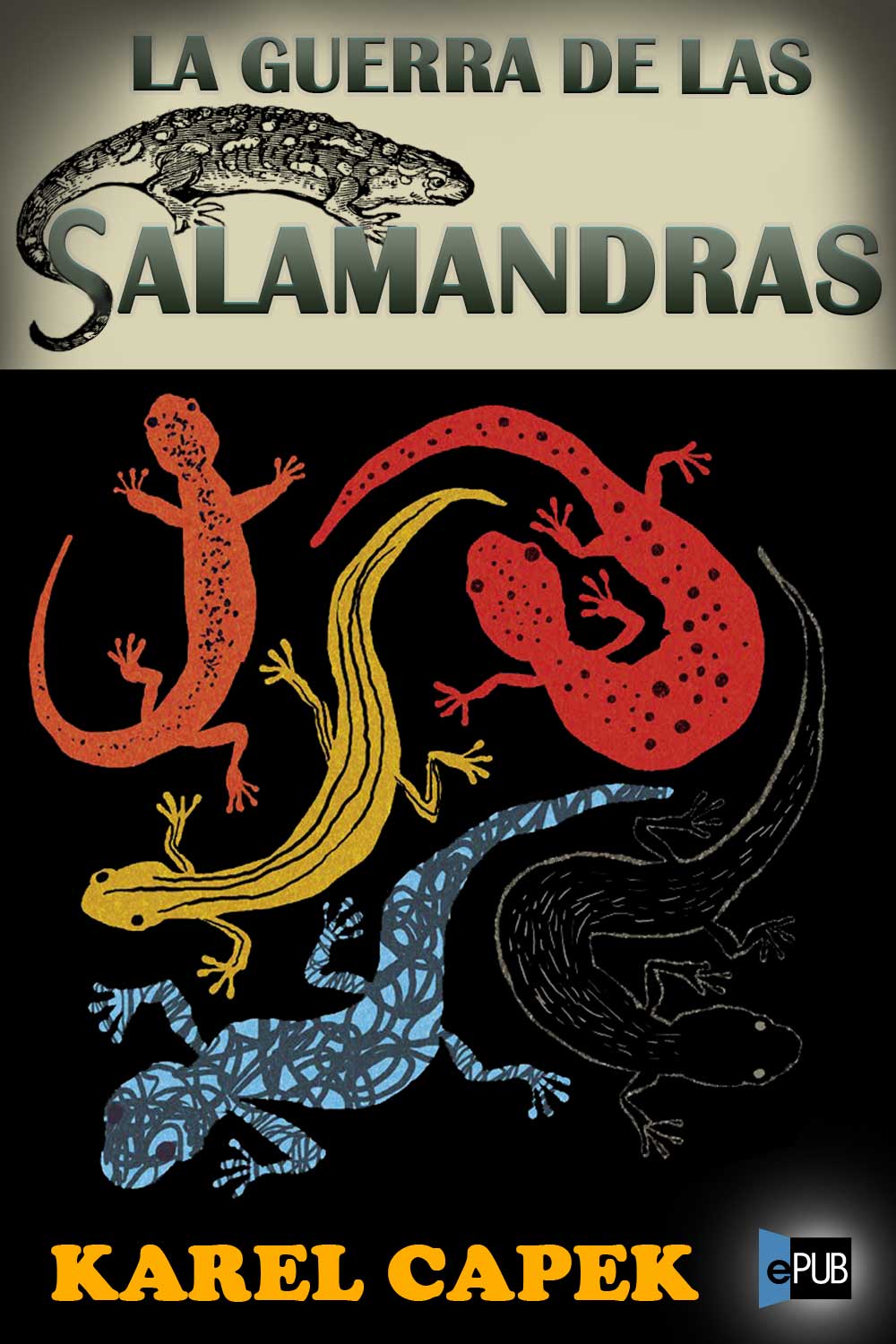
Sinopsis
Un capit?n descubre una especie de salamandras inteligentes en la costa de Sumatra. Les ense?a a hablar y con el tiempo se convierten en mano de obra barata para los empresarios de Occidente... Pero llega un momento en que ya no est?n dispuestas a aceptar esta situaci?n y reclaman el lugar que creen que les corresponde dentro de la escala evolutiva. Escrita en 1936, esta s?tira ironiza sobre el capitalismo sin escr?pulos, la explotaci?n laboral, la carrera armament?stica y el fascismo.
Libros Recomendados - Relacionados
Reseñas Varias sobre este libro
Faking News! Newts Trump Humans!
I'd become rather blasé when it comes to apocalyptic science fiction. I thought I knew them all, those brave new worlds that writers invent to symbolise the immediate danger of human self-destruction out of sheer stupidity?
Think again, Lisa!
The newts invited me to the ultimate, unexpected, completely logical fantasy, containing it ALL. Welcome to a roller coaster of the hilarious kind!
Does it start with the end of the world as we know it, with the destruction of Earth to give way for a space highway The Hitchhiker's Guide to the Galaxy? Not quite, but we are heading there
Does it contain human scientific hubris, The Island of Dr. Moreau? Oh yes, and a lot more ridiculous naivety, if possible! What humans can do, they will do. No matter what the results will be.
What about genetically modified plants that fulfill no purpose except for showing us our irresponsible use of natural resources, in The Day of the Triffids? Actually, the specialised and well-equipped newts make more sense, and are more useful, and potentially more dangerous
What about weapons of mass destruction, used against unknowing humanity, in The War of the Worlds? Well, humans gave the newts the weapons, and they were not to be beaten by bacteria in the end, despite an internal discussion between the author and the writer (yes!) to consider such a possibility.
Best of all, it even suggests a bleak future in Atwoods spirit, showing a drastically reduced humanity in search of new myths, MaddAddam and his people.
All this, and much, much more, is contained in a small unpretentious book, starting off as a mere farcical adventure story. It changes its shape as the story itself changes, from narrative, to report, to discursive essay, to newspaper clippings and back to farcical narrative again. Not once is it boring, even when you have to go back and forth to read the several pages long footnotes explaining the one sentence you read two pages before. Or when newspaper clippings are published in languages nobody has ever been able to translate. Or when
Not once is it boring. It is the funniest road trip to destruction I have ever read, despite the fact that it is a chillingly truthful allegory on the political developments in the 1930s.
It is one of a kind!
And universal!
Yes, universal Salamandrism is the natural effect of human hubris and stupidity. It was nobodys fault, really. Everyone just did what they needed to do, to earn more money, to expand territory, to show off power, to do whatever it is humanity does on a daily basis without thinking.
That the newts were able to take over and to start changing the world according to their needs, thus creating a mythical flood that reset humanity in a state of pre-biblical, pre-Gilgamesh history, was ultimately the direct consequence of humankinds delusion that they would always be stronger, more clever, less vulnerable than all other species!
Beaten by the mediocrity and homogeneity of a species with less extravagant desires, humanity now has to wait for centuries in remote mountain villages until they can start their comeback:
A new myth about a world flood will arise which God sent for the sins of mankind. There will also be legends of submerged and mythical lands which were the cradle of human culture; perhaps there will be a fable about a land called England, or France, or Germany.
And then?
I dont know what comes next.
Thus ends the final dialogue between author and writer, and despite highlighting three quarters of the book, I will not add any more quotes, for it is my honest opinion that every human being and newt on earth should read this excellent tale firsthand!1001-books-to-read-before-you-die favorites havanas-en-masse ...more167 s Mario the lone bookwolf805 4,674
How often this setting has already been used is difficult to say, but the classic evil suppression for maximum profit is as old as humanity. Innocent creatures that are enslaved by the Salamander Syndicate in a technocratic world dominated by economic interests, fanatism and intolerance.
Comparable to Orwells´Animal Farm, Capek describes the cruel exploitation and its possible consequences. Social criticism, fantasy and Sci-Fi combine to a book that was unique in its time and is written with so much dept, wit and ingenuity that it doesn´t seem oldfashioned, boring or lengthy at any moment.
I don´t know if the integration of fictional articles describing parts of the plot has its origins in this work or if it has already been used before by another author. However, the idea is brilliant and has been used over and over again, be it with Pratchett's famous footnotes, quotations, memos, short descriptions or the classic news articles before chapters or as a short refresher between the chapters.
Capek should be named in one line with Orwell, who described the consequences of political extremism and Huxley, who envisioned a soft media/pharma happy go lucky dictatorship as the one who combined it with colonialism and capitalism in it´s most extreme form. One could even go so far as to say that he is even better than both much more popular and well-known authors because he integrates and caricatures all elements and spheres of power and indoctrination.
The way the whole society transforms and integrates the newts in their economic system and how the stages of suppression are just defined by the requirements of the economy opens up room for many interpretations, innuendos and philosophical and social theoretical implications.
Political and economic extremism has hardly ever been satirized in such a deep, perfect and timeless way. One could say that Capek owned both Cassandra and Michel de Notredame and predicted a large part of world history just as it happened after his early death. The main question is who is who in which era and on whose side we are standing right now and if it couldn´t be that we have already been turned into newts without even recognizing it.
Tropes show how literature is conceptualized and created and which mixture of elements makes works and genres unique:
https://tvtropes.org/pmwiki/pmwiki.ph...
A wiki walk can be as refreshing to the mind as a walk through nature in this completely overrated real life outside books:
https://en.wikipedia.org/wiki/Karel_%...
https://en.wikipedia.org/wiki/War_wit...capek-karel156 s BlackOxford1,095 68.9k
Were Here Because You Were There
Not many go unscathed in the comic sarcasm of The War with the Newts: most European nationalities (Dutch and Czech in particular), Americans (especially Hollywood types and Yale alumni), most Asians, religious enthusiasts (including Jews, Catholics, and militant atheists), and all seamen, academics, and newspapermen are castigated by ?apek without mercy. But his primary target is the emerging global capitalism of the early 20th century. I doubt any other work of fiction has captured either the process or the consequences of unrestrained commercial exploitation better than ?apek - consequences for the exploiters as well as the exploited.
By teaching a peculiar species of aquatic lizard to protect themselves from sharks in exchange for pearls, modern industrial freebooters unwittingly create a competitor-civilisation. The hapless capitalists do not realise that there are what economists call externalities or unintended secondary effects of their passionate but ultimately pointless ambitions. The resources they acquire from the newts are worthless except to produce more products to be sold to the newts. Give a newt an oyster and he gets a meal; give him a knife to shuck oysters and he gets a weapon of global domination.
?apek is endlessly witty and his translator is a master at capturing that wit in English. Describing the tribal chief of an isolated village in Indonesia: He was an elderly gentleman and naked, but far thinner than mayors are in Europe. And the tenacious clinging of oysters to their rocky beds as Shells that stick fast to the stones the Jewish faith. And he knows his differentials when it comes to Catholic piety: Then I shall have a Catholic mass said too, decided Jens Jensen. For Captain van Toch. But I shall have it said here in Marseilles. I think that in that big church theyll do it cheaper, cost price. It could be; but an Irish mass is the real thing. In my home, man, the Jesuits are devils; they can nearly do wonders. Just witch doctors or heathens. And ?apek is not averse to the odd important sociological observation such as Fossil reptiles prefer blondes!
In his introduction, Robert Adams says ?apek writes G.K. Chesterton. Hes wrong. ?apek is much more entertaining. His wry commentary on sex, business, and the ironies of human ambition could never emanate from Chesterton. And the cosmopolitain ?apek makes Chesterton look a provincial hack. His attack on European colonialism is as relevant as it ever was in our era of continuing global exploitation of the poor by the rich, not least because of his insight that it leads to massive population movements that are universally destructive.sci-fi slavic144 s Glenn Russell1,418 12.3k
Its war! Humans versus newts. And odds favor a newt victory since a number of key factors work in their favor: newts can continue fighting even after losing two-thirds of their internal organs; newts are absolute realists and make highly disciplined soldiers since they are not bogged down by things fantasy or humor or lofty ideas; the current population of these creatures standing four foot high when walking upright on their hind legs has reached over twenty billion, outnumbering humans ten to one. Twenty billion! Thats a lot of well-armed, fighting newts.
Such is the crisis in Karel ?apek's 1936 novel, War With the Newts, a highly entertaining satirical dystopian alternate history that's, in turn, fascinating, humorous, a tad unsettling and occasionally downright creepy. The Czech author has addressed similar themes in his most famous work, RUR (Rossum's Universal Robots), a play where the word robot appeared in writing for the first time. In the play its humans versus robots, in the novel Karel ?apek traces the history leading up to the newt wars, beginning with the discovery by one Captain van Toch of these giant salamanders living underwater off the coast of a remote Indonesian island.
The captains dealings with these amiable creatures starts off innocently enough: the newts trade pearls for knives whereby they can better open oysters, their main diet. Ever the opportunist, van Toch rekons these newts can be his pearl hunters all across Indonesia. Sharks have always kept the newt population in check. So, to increase their numbers, the captain arms the newts with anti-shark guns. More newts, more pearls, more money. And as soon as the good Captain recognized these tireless workers so eager to please are especially fit for underwater construction and could effectively be put to use for human engineering projects, he shares his vision with a leader in the world of industry and commerce.
Bingo. It's not long before the formation of The Salamander Syndicate, owning and trading millions of newts across the globe. Newts boost the world economy utilizing a newt workforce, nations claim more ownership of the oceans and seas. Meanwhile, after subjecting newts to extensive tests and experiments, scientists write articles explaining now that newts have expanded their habitat, the coiled-up spring of evolution has been provided an opportunity to unwind.
Philosophical issues arise: Does a newt have a soul? The answers are mixed. A Colonel Britton discoveres newts have no sense of honor or patriotism; Arturo Toscanini observes newts have no music; Mae West can plainly see newts are devoid of sex appeal, thus, on all three counts, newts have no souls. On the other side, a spiritual teacher from India, Sandrabharata Nath, is quoted as remarking: They have a soul every other creature and every plant as does everything that lives.
Let the Newts receive a proper education! Many are taught French, literature, rhetoric, etiquette, mathematics and the history of art. Some of the salamanders can even quote Cicero. One journalist observes newt comprehension of the newspapers is at the level of the average human. Prompts us to wonder about those men and women below average. "Human intelligence" begins to sound an oxymoron.
The Society for the Prevention of Cruelty to Animals and other pro-salamander organizations attempt to insure newts are not treated cruelly or inhumanely not only in their capacity as workers to advance human economy but in all areas of their salamander lives. These goodhearted people must fight ongoing battles on many fronts since the gullible newts willingly play the part of lackey and toady (such irony in this amphibian term) for their brutal human overseers.
Big theological question could newts be baptized? The Catholic Church says no since newts are not Adams descendants. However, Protestant churches distribute many millions of copies of Holy Scripture for the newts on waterproof paper and a few eccentric Christian sects attempt to baptize newts. One philosopher even goes so far as to compose a special religious system for newts including faith in the Great Salamander. Where's Christopher Hitchens when you need him most?
Years pass. Millions upon millions of newts are everywhere. Young newts want to make football, fascism, sexual perversion and other things human part of their everyday lives. Old newts advocate sticking to traditional newt ways. Well, sort of - those old newts don't mind reading the daily news in human newspapers.
Comrade newts! Bourgeois civilization has enslaved your souls. Newts are the new working class; newt labor should be prohibited. So shouts pesky liberal agitators. But governments and commercial interests quickly point out how newts have special skills underwater and that the overall standard of living for humans have risen dramatically. Equally important (actually, more important) profits have risen. If no working salamanders then twenty percent of all factories worldwide would be forced to shut down precipitating economic disaster.
Do you detect the entire face of planet earth has been radically altered? Karel ?apek masterfully lampoons and satirizes how we humans can so readily sacrifice decency, compassion and respect for the balance of nature in our quest for self-aggrandizement through the worship of nationalism, economic power and military might. And to think this novel was written on the cusp of the rise of Hitler and Nazism.
Karel ?apek (1890 -1938) from Czechoslovakia, novelist, playwright, essayist, literary critic, photographer, art critic. Much influenced by William James and American pragmatism, he unceasingly campaigned for free expression and against all forms of fascism and communism.128 s Lilo131 409
Satire is my favorite genre. And this book is a gem.
Nowhere have I ever found a better description of homo sapienss boundless greed, bigotry, stunning thoughtlessness, and utter stupidity.
This book leaves no parts, levels or facets of society unscathed. Karel Capek satirizes science, academia, education, business, politics, fascism, communism, militarism, law, religion, philosophy, racism, journalism, and just about every trait of human nature one can think of. Yet it isnt all funny. It is also sad and scary. The centre topic of the book is how discrimination leads to exploitation, violence, and cruelty. This will make you cry instead of laugh. And it will make you more cry when you realize that little has changed since 1936, when the book was written.
I wish Karel Capek were still alive and could shoot his satirical arrows at targets in our present world. He wouldnt have to look very far to find plenty.
This book is a must-read for everyone who is interested in the future of our planet. And I can assure you: In order to achieve an apocalypse, newts wont be necessary.
I am surprised that this book and its author are quite unknown outside of Czechoslovakia. War With the Newts should be a classic. The authors other works and his life story also deserve more attention. I recommend reading what Wikipedia tells about Karel Capek. Here is the link:
https://en.wikipedia.org/wiki/Karel_?...
I also recommend reading Charley Adas, more detailed review of War With the Newts. Here is the link:
https://www.goodreads.com/review/show...
P.S. February, 7, 2021: After following and experiencing recent history here in America, I have come to the conclusion that "War With the Newts" is no longer very far off. History in the making has been overtaking satire. humor-satire racism read-as-paper-book116 s Spencer Orey582 172
This is one of those bizarre masterpieces that nobody could ever get published today. It's a really bleak but clever and thoughtful take on an idea that then sees that idea allllll the way through. And its sharp politics mostly hold up!
I admire the commitment here to thinking a scenario out so fully. seriously it thinks it all the way through, even jumping styles through international newspaper stories that tell short and touching human life stories that also advance the general story. At some points it's more an accessible nonfiction book but about this bizarre and escalating global newt situation, and even those parts are great to read.
It's amazing.
Imperial European racism, the rise of fascism, and corporate profiteering are in full focus, with a brief comical chapter about wannabe movie star Americans. There's some unfortunate racism and casual Orientalism, but that also makes sense in terms of the story itself (not a justification). There are also profound and sometimes sly critiques of the slave trade and the racism of colonization.
Read this if you're into evolutionary worldbuilding, critiques of imperialism, snark attacks on Europe, that kind of thing. Or if you're looking for something really thoughtfully weird. Or if you just want to know what is up with the newts.95 s Dream.M615 90
??????? ?????? ?? ???? ???? ?? ??? ?? ?????? ???? ????? ? ????? ???????? ???? ?? ????? ???? ????? ??????? ????? ???? ???? ??????? ??? ? ??? ????? ??? ??. ??? ????? ????? ?????.
??????? ?? ??????? ????? ???? ??????? ???? ???? ????? ????? ?????? ????? ? ??? ???? ?????? ?? ???? ???? ????? ?? ???? ????????. ??? ?? ??? ???? ??????? ???? ??? ??? ????? ??? ????? ?? ?????? ?? ?????? ???? ? ??????? ??? ??? ???? ?? ?? ????? ?? ????? ?????? ? ????? ??????? ?????? ????? ??? ???? ????? ?? ????? ???? ? ?????? ?? ????? ??? ????? ??? ?? ???? ???? ?? ?? ?????? ????? ???? ?????? ???? ???. ???? ??? ????? ?? ????? ???? ???? ????? ?????.
????? ???? ????? ??????? ?? ?? ?? ?? ???? ???? ????? ??????.
???? ??? ?? ???? ?????? ?????? ??????? ?????? ?? ???? ???? ?? ???? ??????? ??? ?? ????? ?? ?? ???? ? ???? ???? ??? ??? ?? ???? ????? ? ?????? ????? ?? ???? ? ???? ??? ?? ???? ???? ???? ??? ? ??? ???? ?? ???? ????? ??? ?? ??? ??? ???? ????? ????? ???? ????? ??? (??? ???? ???? ??????? ??? ??).
??? ??????? ?? ??? ???? ???? ??????? ???? ??? ?????? ?????? ?? ? ?? ????? ???? ?????? ?? ? ????? ???? ???? ? ????? ???? ????? ???? ?? ????. ???? ??? ?????? ?????? ?? ????? ??? ? ?? ????? ?????? ?? ???? ???? ??? ????.
???? ?? ???? ???? ???? ???? ?? ????? ?? ??? ???? (?? ??? ?????? ??? ????? ) ??? ??????? ?? ???? ????? ????? ? ?? ?????? ??? ????? ?? ???? ???? ??? ?? ???? ? ????? ???? ?....
?? ???? ??? ?? ??? ???? ?????? ? ???? ?????? ?????? ??? ????? ?????? :))
?? ???? ?? ???? ???? ????? ???? ??? ??? ?????? ??? ????? ?????? ????? ??????. ??? ????? ???? ?????. ??? ?? ??????? ? ?????? ??? ????? ?? ????? ???? ?????? ???? ????.novel-long-story80 s Argos1,109 359
?lk sözüm; çok çok iyi bir kitap. Böyle bir eser neden bu kadar az tan?n?yor, neden bir bask? ile yetinilmi? ve sat??? yok anlamak mümkün de?il. San?r?m telif sorunu da yok ancak sadece Everest Yay?nlar? 2008 bask?s? ile yetinilmi?. De?eri bilinmemi? kitaplar vard?r, bu kitap da onlardan biri, benzerlerinin yani distopik kitaplar?n (1984, Cesur Yeni Dünya, Dünyalar Sava??, Fahrenheit 451, Mülksüzler vb) kesinlikle alt?nda de?il. Bu cümleden anla??laca?? üzere bir bilimkurgu roman?, distopik roman Semenderlerle Sava?. San?r?m yazar?n kendi deyi?iyle bir komunist olmamas? bu anti-fa?ist roman?n sol yelpazede görmezden gelinmesine bir gerekçe olu?turmu?, solun çocukluk hastal???. Tabii bu benim dü?üncem.
Arka sayfa tan?t?m yaz?s?nda belirtildi?i gibi Çek yazar Karel Çapek 1930larda ba?layarak Avrupada yükselen fa?izm tehsini tüm yönleriyle görmü?, bu teh kar??s?nda Avrupa devletlerinin ç?karc?l??? ve kay?ts?zl???n? kara mizah diliyle bilimkurgu tarz?nda aktarm??. Çapek kitab? 1936da yazm?? ve iki y?l sonra ölmü? ancak yazd?klar? kehanet gibi bir y?l sonra 1939da nazi Almanyas?n?n Polonyay? i?gal etmesiyle gerçekle?meye ba?lam??, yani II. Dünya Sava?? felaketi.
Çapek kurgusunda insan?n kar??s?na semenderleri koymu?, fantastik bir seçim, ama biliyoruz ki di?er distopik kitaplarda oldu?u gibi iki grup insan var: ?yi insan ve kötü insan, ba?ka bir tan?mla gayr?-insan, kötücül insan, öteki-insan. Çapek kötü insan? semenderlerle anlat?yor. Kitap bitince görüyorsunuz ki hepimiz semenderiz.
Yazar?n dili ve uslubu gayet iyi. Kitab?n kurgusu da çok iyi. Üç kitaba bölmü? yazar eserini; ilk kitapta semenderlerin ortaya ç?k???, ikinci kitapta semender uygarl???n?n yükseli?i ve üçüncü son kitapta insanlarla semenderlerin sava?? yer al?yor. Kitab?n vurucu bölümü bu bölüm.
Kitab?n ba??nda çevirmen Sabri Gürsesin mükemmel çevirisine ek olarak kitap ve yazar hakk?nda verdi?i çok yararl? de?erlendirme yer al?yor. Sonra bu kitab? ele?tiren Andrey Platanovun ele?tirisi konulmu?. Bu ele?tiri kitaba ayr? bir de?er de kat?yor. Çünkü rejim muhalifi olan Platanovun fa?izm de?erlendirmesi oldukça farkl?. Platanov bu de?erlendirmeyi rejimin kendisine yapt??? bask?y? azaltmas? için mi yazd??? sorusu geliyor akla. Sanki G. Lukacs?n Anna Seghersin Yedinci ?afak (Yedinci Haç) adl? eserine yapt??? haks?z ele?tirinin bir benzerini çok be?enerek okudu?um Platanov Çapeke yapm?? gibi geldi bana. Okuyunca siz de de?erlendirirsiniz. Romandan önce k?sa bir bölüm daha var, yazar?n Platonova verdi?i cevap niteli?inde Neden Bir Komunist De?ilim yaz?s?. Burada önemli bir not, lütfen do?rudan roman? okumaya ba?lay?n. Bu ön bölümleri okursan?z roman hakk?nda ayr?nt?lar? önceden ö?renmi? olursunuz bu da tad?n?z? kaç?rabilir.
Çapek ba? semenderin bir insan?n oldu?unu ve Birinci Dünya Sava??nda çavu? oldu?unu yazarak do?rudan Hitlere gönderme yapm??. Semenderlerin kulland??? sloganlar da Nazilerin sloganlar?: Tek millet, tek devlet, yabanc?lar d??ar?, soylu kuzey semenderi, ya onlar ya biz vb... Kapitalizmin ve teknolojik geli?melerin insanl??? iyi insandan kötü insana yönlendirdi?i, f?rsatç?l?k ve ç?karc?l?kla birle?erek totaliter yap?ya, fa?izme nas?l doludizgin gidildi?ini çok güzel anlatm??.
Yazar?n baz? öngörüleri var ki kehanet gibi, i?te birkaç örnek; 1944de Müttefik kuvetlerin ç?kartma yapt??? yer olan Normandiyan?n kitapta semenderlerle insanlar aras?ndaki kanl? mücadelenin yeri olarak belirtmesi. Keza 1945 Birle?mi? Milletlerin kurulmas?n?n (kitapta Londra Uluslararas? Konvansiyonu), ayn? ?ekilde 1946da Uluslararas? Adalet Divan?n?n Laheyde (Hauge) kurulmas?n?n (kitapta Haugedaki Hakem Mahkeme olarak geçiyor) neredeyse aynen öngörülmesi çok etkileyici, çünkü bunlar? Çapek 1936da yazm??. Kitap yaz?ld??? zaman Hitler iktidara gelmi? (1933) ve Cumhurba?kan? olmu?tu (1935). Alman halk? ölene kadar art?k onunla führerleriyle birlikteydi.
?kinci kitap romana inand?r?c?l?k kazand?rmak için biraz akademik-bilimsel kurgu ?eklinde yaz?lm??, bu bölümdeki dipnotlar?n?n okunmas? okuma ak?c?l???n? biraz bozuyorsa da kitab?n geneline bak??? de?i?tirmiyor. Kolay okunuyor ve gerçekle?mesi mümkün olan birçok olay mizahi bir dille anlat?l?yor. Kitap yazar?n insanl??a ili?kin ucu aç?k bir cümlesiyle sona eriyor. Bu kitab?n haketti?i ilgiyi görmesini umut ediyorum.70 s Guille828 2,089
La guerra de las salamandras es la típica novela que seguramente jamás leerán justo aquellos que más necesitarían leerla. Una paradoja que no llega a ser ni preocupante pues seguramente serían incapaces de enterarse de nada y mucho menos de darse por aludidos. - Las salamandras son salamandras -gruñó Bellamy, encogiéndose de hombros y desviando el asunto.
- Hace doscientos años también se decía que los negros eran sólo negros.
- ¿Y acaso no es verdad? - dijo Bellamy.
Los Bellamy nunca creen que hagan nada malo. Por eso son incorregibles. Ellos se lo pierden, el tono satírico, por muy cruel que en el fondo sea lo expuesto, con el que el autor trata un buen montón de cuestiones morales, éticas, sociales, políticas es de todo menos aburrido y no son pocas las veces en las que es francamente divertido. También es un punto a su favor la originalidad con la que las presenta esa amalgama de géneros y formatos que configuran este puzzle a modo de álbum de recortes que es la novela quizás ese álbum que preparaba el pobre señor Povondra. Ellos se lo pierden, sí, aunque en realidad perdemos todos.
Así considerada, la novela me ha parecido notable, pero en literatura mis necesidades van algo más allá. Necesito que, hablándome a la razón, me ganen por el corazón, y en este campo la novela no ha estado a la altura. Se me ha hecho imposible otorgarle esa cuarta estrella que marca mis preferencias. Así nos comimos a una salamandra a la que llamábamos Hans. Era un animal culto e inteligente, con especiales disposiciones para el trabajo científico. Trabajaba en el departamento con el Dr. Hinkel, como su ayudante, y se le podían confiar los análisis químicos más delicados. En las largas noches teníamos conversaciones interesantes con él, y nos distraía su insaciable afán de saber. Tuvimos que deshacernos con gran pesar de nuestro Hans, pues a causa de unos experimentos que hice en él sobre trepanación, quedó ciego. Su carne era oscura y esponjosa, pero no produjo en nosotros ninguna reacción desagradable. Muchos son los objetivos sobre los que ?apek dispara su mortífera ironía, muchos los colectivos que toma como ejemplos para destacar las muchas sandeces que nos caracterizan como especie, pero sobre todas ellas destaca nuestro jodido afán por la diferenciación. Esa diferenciación que nos lleva a separarnos por la raza, la religión, la lengua, la nación, la situación económica o la sexualidad, pero que también nos aleja por gilipolleces como un equipo de fútbol, un tipo de música o un estilo de ropa. Sí, señoras y señores, nos sobran los motivos. Llevamos estas diferencias a categorías ontológicas y, lo que es más terrible y estúpido, nos ayudan a crear frentes, grupos cerrados, a sentirnos diferentes y pocos son los que, sintiéndose diferentes, no se sienten, al mismo tiempo, mejores. De ahí al conflicto, al odio, al enfrentamiento, no hay ni medio paso. Más tarde o más temprano, cada presunto "todo" homogéneo se desmoronará irremediablemente en grupos sin coordinación, con diferentes intereses, partidos, posiciones, etc., que, o bien se destrozarán entre sí, o sufrirán de nuevo los tormentos de la vida en común. Unos enfrentamientos que desgraciadamente nos impide afrontar problemas verdaderamente importantes de una forma global que es la única forma eficaz de poder abordarlos. El individualismo y el sálvese quien pueda que está en la base de ese capitalismo ultraliberal sin control ni oposición que cabalga desbocado en pos del beneficio de unos pocos y que consigue vender, con la inestimable ayuda de los medios de comunicación y ahora también con la de una legión de hackers a sueldo, la idea de un interminable crecimiento del bienestar universal que se extenderá hasta el infinito y más allá, queda aquí perfectamente retratado. Por ello, la novela no puede ser más actual. Cambien a las salamandras por el cambio climático y aquí encontrarán, paso a paso, lo que está pasando en el mundo y hacia dónde nos dirigimos. Esto es sencillamente la lógica de los acontecimientos....Todos tenían miles de objeciones económicas y políticas -igualmente justas- sobre por qué no se debía hacer (nada en contra de las salamandras). En fin, he estado alrededor de una semana viviendo entre salamandras, y ya les digo que al menos dos de ellas no eran mi mucho menos esos esperpentos que nos describe nuestro amigo ?apek, ni tampoco esos seres sombríos que nos dibuja Hans Ticha en la fabulosa edición de El zorro rojo que he tenido la dicha de disfrutar. Por toda explicación, más que suficiente, creo yo, diré simplemente que eran oriundas de la costa gallega. También ellas me hicieron ver algunas de esas estupideces a las que tan aficionados somos los seres humanos, y, aunque no tan peligrosas colectivamente como las imaginadas por el autor checo, son desatinos lo suficientemente graves como para provocar grandes catástrofes a nivel individual. Pero bueno, esa es otra historia.60 s H.M. AdaAuthor 1 book386
A Dutch sea captain discovers intelligent, human-sized newts in a remote island bay.
So he does what anyone would do and tells somebody with money. The Newts are then put to work building harbors and extending coastlines, and hilarity ensues. Well, for the most part. There is a war at the end of this book. Racism is also a major theme, both directly and allegorically through humanity's treatment of the Newts.
The humor is sarcastic and in a few places dark. It skewers all elements of society: industry, academia, the media, law, political activism, religion, etc. None of the characters stay for very long, and unfortunately, we don't get to know any of the individual newts very well. The character studied in this novel is humankind, and all of its foibles.
In a way, I thought the events were a realistic prediction of what might happen in this situation in the real world. Some parts of society were more to blame than others, but ultimately it felt there was no one really "steering the ship" - just a series of independent self-interested decisions and predictable social and economic trends leading humanity toward inevitable disaster.
At times, some of the jokes made me feel I was watching a Simpsons episode. At least, they had that kind of intelligent, absurd, undercuts everything type of humor. My absolute favorite was when (by the time it should have been obvious the Newts were intelligent), someone asked at a corporate shareholder meeting (about increasing profits) whether the company's newts were edible.
All in all, a great read that I'd recommend to anyone.
favorites social-commentary54 s Reza Abedini142 32
??? ?? ?? ??? ??? ?? ??? ??? ????? ?? ?? ?????? ????? ??? ???? ?? ??? ?????? ????? ?????? ??????? ??? ????? ?? ?? ?????? ?? ???? ???? ????? ????!
?????? ??? ???? ???? ???? ??? ????? ? ????? ????? ?? ????? ???? ???? ???? ??? ??? 1984 ?? ?????? ?????? ? ????? ?? ????? ?? ??? ?????? ?? ?? ??? ???? ????.
??? ?????? ???
????? ????????? ? ??????? ??????? ?? ??? ????? ??? ???????? ?? ???? ?????? ?????!
???? ????? ?? ??? ??? ?????? ? ??????? ??????? ?? ???? ??? ?? ????? ????? "???? ????"
?????? ???? ???? ??? ????? ????? (??? ?? ??? ??? ??? ???? ???) ??? ??? ?? ????? ?? ??? ???? ????? ?????? ????? ??? ?? ??? ??? ??????? ?? ??? ??????.
???? ??????? ?? ???? ?? ???? ?????? ???? ??? ?? ????? ???? ?????? ?? ??? ?????? ?? ???? ???? ??? ?? ??? ??? ?? ??????? ? ???? ? ??? ??????? ?? ? ???? ??????
???? ?? ???? ???????? (??? ?? ????? ??? ??????? ??? ?????? ???? ??? ???? ? ???? ???? ?? ?? ???? ??????) ?????? ?? ???? ?????
??????? ???? ????? ???? ?? ???? ????? ????? ??? ????? ??? ?? ????? ??? ?? ??? ? ????? ?? ??? ??? ????? ????????? ????? ?? ?????
???? ??? ???? ??? ?? ???? ???? ????? ????? ?? ??? ?? ?????? ????? ???? ??? ???? ?? ?????? ???? ??? ????? ??? ? ?????? ?? ?? ????? ??? ???? ?? ????? ????? ?? ???? ????? ? ?? ????? ????? ??? ?????? ?? ?? ?? ???? ? ????? ???? ???? ???? ??? ????? ? ??????? ?????? ?????? ????? ? ????? ????? (?????? ????????? ??? ??? ?????)
???? ????? ????? ??? ????? ? ?? ???? ?? ??????? ?????? ????? ????? ???? ????? ???? ? ????? ???? ???? ?? ? ????? ??? ?? ?? ???? ??? ???? ?? ???.
????? ???? ???? ?? ??? ?????? ?????? ??? ???.
???? ?? ??????? ?? ???? ???? ? ???? ????? ???? ?? ????? ????? ? ?????? ??? ???? ? ????? ???? ????? ?? ?????.
? ?? ???? ????? ???? ????? ???? ? ??? ??? ????? ??? ????? ? ????? ?? ?????? ??? ? ???? ??? ?????? ?? ?????? ???? ????? ???? ?? ?????? ?????? ?? ????? ????.
??? ?? ???? ??? ???? ???? ???????? ??? ??? ?? ??? ??????? ? ????? ??? "????? ???" ??? ?? ????? ??? ???? ?? ??????? ? ???? ?? ??????? ? ??? ?? ??? ????? ???? : ??? ??????? ?? ?? ??????? ???? ??? ????? ???? ??? ?? ?? ????? ???????? ???? ?? ??? ? ???? ??? ???? ???.
???? ??? ?? ?? ??? ???? ????? ?????? ? ?? ?? ???? ????? ?????? ? ??? ????? ? ?? ??? ???? ?? ?? ???? ????? ?????? ??? ????? ? ?? ??? ??? ???? ??? ???? ??? ?????? ?? ?? ????? ?? ??????
?? ???? ?? ?? ??? ???? ?????? ????? ? ???? ?? ?? ????? ??????.
? ????50 s Ali Karimnejad314 187
4.5
??? ??? ????? ?? ??? ??? ??
??????? ?? ????? ?????
????? ?? ???? ??? ??????
????? ??? ??? ??? ?? ?????!?
?? ????? ????? ?? ?????? ?????????? ???? ???? ?? ?? ??? 1936 ? ??? ?? ??? ????? ??? ????? ??? ? ??? ???? ?? ???? ???? ???? ???? ???? ????? ??????? ??? ????? ?????? ???? ????? ??????? ???? ??? ?? ??? ???? ????????!?
???? ?? ???? ???? ??? ????-???????????-???????(!) ???? ?? ?? ?? ?????? ????? ???? ? ????? ???? ?? ???? ? ????????? ?? ? ??? ??????? ?? ????? ???? ????. ? ????? ???? ???? ? ???? ?????? ?? ?????? ????-????? ???? ??? ??? ????? ?? ???? ?? ??????? ?????? "???? ????? ????????" {?? ??? ??? ???????} ? ?????????? ????????? ??? ???? ?? ??? ?? ?? ??? ??? ?????? ? ?? ???? ????? ???? ????? ???? ?????? ????. ?? ??? ??? ???? ??????? ?? ??? ?????? ?? ????? ??? ?? ???? ? ???? ?? ?????? ????? ? ??? ???? ?? ?? ????? ??? ????? ?????.
?? ??????? ?? ???? ?? ????? ????? ? ???????? ????? ?? ???? ?? ????? ?????? ???? ???????? ??????? ????? ?? ??????? ??? ???? ??? ????? ?? ?? ?? ??????. ?? ??? ????? ? ?? ?? ???? ????? ??? ?? ???? ???? ?????????????! ??? ???? ?? ?? ??????? ?????? ?? ??????????? ? ?? ??????? ????? ????. ?????? ????? ?? ??? ????? ????? ? ?????? ?? ????? ???? ???? ?? ????? ?????. ?? ?????? ?????? ????? ??? ?? ???? ?? ?????? ?? ?? ??? ??? ???? ????? ????? ? ???? ???? ???? ??????? ?? ?? ??????.
?????? ?????? ??????? ???? ??????? ?? ???????? ?????? ????? ?????? ?????? ??? ???? ?? ?????? ?? ??? ?? ???????? ????? ??????? ?? ???? ???? ????????? ???? ???? ?? ???????? ????? ???? ??? ????. ??? ???? ???????? ? ????? ???? ?? ????????? ????? ?????? ????? ?? ?????????? ???? ? ... ???? ?? ???? ?????????? ???? ?? ???? ?? ?????? ????? ???????????? ????? ?????.
?? ??? ????? ??? ???? ????? ?? ??? ??????? ?? ?????? ??? ?? ????? ???? ?????????. ?? ??????? ??? ?? ?? ??? ?? ???? ???? ??? ????? ???? ???? ? ???? ???? ???????. ?????? ?? ??? ??? ??? ???? ??????? ???? ?? ?? ??? ??? ??? ??????? ? ??? ?? ???????? ???????. ??? ???? ??????? ?? ????? ?? ???? ????????? ? ????? ??????. ???? ?? ???? ???? ????? ????????? ? ??? ?? ?????? ?? ???? ??? ??? ?? ????? ???? ??????. ???? ????? ???????? ???. ????? ?? ??? ??? ????? ??? ??? ?? ??? ??????? ?? ?? ? ????? ???????? ????? ????? ?? ???? ??? ????? ??????? ??? ??? ???? ?????? ?? ??? ???. ???? ?? ????? ?? ??? ?? ??? ???????? ???? ???? ????. ??? ????? ????? ???? ???? ???? ??? ??? ????? ?????? ????? ???? ?? ?? ?? ????? ???? ?? ????? ?????? ???? ?? ?? ????? ?????? ? ??? ?? ???? ???? ?? ??? ????? ????? ???? ??? ?? ? ???? ? ?? ????? ?????? ????? ?? ????? ???? ???? ???? ????? ????? ??? ????? ????? ?? ??? ??? ?? ????? ????? ??? ?? ?? ???? ??????? ?? ?????.
?.?: ????? ?? ????? ?? ??????? ?? ?? ?????? ????? ???? ????? ???? ??? ???? ?? ?? ??? ???? ????.
?.?2: ???? ????? ?? ??? ???? ?? ???? ???? ????. ?????? ??? ???.
48 s Peiman E iran1,438 766
???????? ???????? ??? ???? ?? 11 ??? ? 300 ???? ????? ??? ???... ??? ??????? ????? ? ????? ?? ???? ?????? ???? ??????? ?? ?? ????? ???????? ? ??????? ???? ???? ?????
??????? ?? ?????? ???? ????? ?? ????? <??? ???> ?? ????? ????? ??????? ??? ????? ?? ?????? ??????? ????? ???... ??? ????? ?? ?????? ???? ???? ?? ???? ???? ???? <????? ??> ?????? ????? ?? ?? ?? ????? ????? ?? ????? ??????... ????? ?? ??????? ?? ?????? ???? ?????? ?? ??? ???? ????? ??????? ??? ?? ?? ??? ?? ?? ????? ????? ????? ?? ???????? ?? ??? ???? ????? ?????? ?? ???? ????? ? ???? ????? ????? ? ?? ????? ?? ?? ?????? ?????? ???
??????? ????? ????? ?? ??? ???? ? ???? ????? ?? ?? ?????? ???? ? ??? ??????? ?????? ?? ???? ?????... ???????? ????? ????? ?? ?? ????? ???????? ?? ????? ???? ??????? ???? ? ??? ?? ???? ??????? ??? ??????
???????? ?? ??????? ?? ????? ????? ???? ???? ??? ?? ?????? ????? ?? ???? ???? ?????? ??? ??????? ?? ?? ???? ????? ???? ? ?? ???? ?????? ????? ? ?? ??? ??????? ?? ??????? ??????... ?? ???? ? ????? ? ?? ????????? ? ?????? ?????? ?????? ?? ??? ??????? ???? ??????? ? ????? ???????? ??? ?? ???? ????? ??????? ? ??????? ?? ???? ?? ??? ??????? ???? ?? ???? ?? <?????> ???????? ?? ??? ????? ??? ????? ? ??? ???? ???? ??? ?????? ???? ???? ??? ? ???? ? ???????? ?? ?? ??????? ?? ??????
???? ? ??????? ??????? ?? ??? ??????? ???? ?? ???? ?? ????? ??????? ??????? ? ?????? ? ???????? ????? ? ????? ????? ?? ???? ?? ?????? ? ???????? ??? ??????? ???? ????? ? ?? ?? ?????? ???? ?? ????? ? ???? ? ??????? ???? ??? ???? ???? ???
???? ???????? ??? ?? ???? ???? ?? ??? ???? ????? ???? ????? ???? ??????? <?????> ??? ?? ?? ?? ????? ??????? ????? ?????? ? ????? ???? ????? ?? ??? ????? ? ???? ?? ???? ?? ??????? ???? ???? ????? ??????... ???? ?? ?? ??? ???? ??? ? ????? ???? ??? ???? ??? ??? ??: ??? ?? ?? ????? ??????? ???? ? ??????? ?????? ? ?????? ?? ?????? ????? ????? ? ????? ???? ??? ?? ??? ?????? ????? ???? ????? ? ????? ????? ?? ????? ???? ? ??? ?????? ?????? ?? ???? ???? ???? ?????.... ???..... <?????> ?? ????? ??????? ?????
????? ??? ?????? ??? ?????? ?? ??????? ? ?? ??????? ?? ???? ????... ??? ??????? ???????? ???? ? ??? ???? ?? ?? ????? ???????? ???? ? ?????? ?? ???????!? ???????? ?? ??? ???? ????? ?? ?? ??????? ?????? ???? ? ?? ???? ?????? ????? ????... ???? ??????? ???? ?? ??? ? ???? ? ??? ?????????
--------------------------------------------
????????? ?? ??????? ??? ?????? ??? ?????
?<????? ????? ? ??????>??????-?-????42 s Linh164 242
M?t ki?t tác c?a th? k? 20. Th?t ng?c nhiên là l?i quá ít ng??i bi?t t?i Karel Capek nh? v?y. Tác ph?m châm bi?m g?n nh? t?t c? m?i th? trào l?u c?a th? k? 20: ch? ngh?a tiêu th?, ch? ngh?a phát xít, ch? ngh?a th?c dân, ch? ngh?a c?ng s?n, bài Do Thái, các lo?i gi?-khoa-h?c, ch?y ?ua v? trang...
Ch? m?t loài l??ng thê có tên là sa giông mà ng??i ta có th? hình dung v? t??ng lai (và nh? l?i v? quá kh?) c?a loài ng??i: S? ph?n c?a sa giông, khi thì làm ng??i ta nh? t?i ng??i da ?en, khi thì là thân ph?n ng??i Do Thái d??i ách ??c phát xít (?o?n mô t? các thí nghi?m v?i sa giông c?a các nhà khoa h?c rùng r?n không kém gì các thí nghi?m v?i ng??i Do Thái trong th? chi?n th? 2- m?t ?i?u th?c t? ?ã x?y ra trong ch?a ??n 1 th?p k? sau khi tác ph?m này ra ??i), khi thì gi?ng nh? các c? máy s?n xu?t phi nhân tính, ni?m m? ??c có l? là c?a c? Henry Ford và Karl Marx (có m?t nhà tiên tri r?t gi?ng Karl Marx c?ng xu?t hi?n trong ti?u thuy?t nh? này v?i l?i phán truy?n v? m?t th? gi?i sa giông ??i ??ng h?u con ng??i).
Không ch? ti?p n?i truy?n th?ng c?a nh?ng ki?t tác châm bi?m nh? Gulliver's Travel c?a J. Swift hay Ngh? nhân và Margarita c?a M. Bulgakov, tác ph?m này c?a Capek còn là tiên phong trong th? lo?i sci fi v? t?n th?. Có th? th?y sa giông r?t gi?ng v?i robot, nh?ng th? lao ??ng giá r? do con ng??i t?o ra và có th? trong t??ng lai ?e d?a tr? l?i s? t?n t?i c?a con ng??i. ?i?u khá thú v? là chính Capek là ng??i ??u tiên s? d?ng t? "robot" trong m?t tác ph?m v?n h?c (m?t v? k?ch c?a ông). Tuy nhiên theo ông thì cha ?? c?a t? này là anh trai ông, m?t h?a s? n?i ti?ng c?a Ti?p.
Capek ch?t n?m 1938, ch? hai n?m sau khi ki?t tác này ra ??i. Cái ch?t ?ó c?a ông có l? c?ng là may m?n ?? ông không ph?i ch?ng ki?n nh?ng th?m h?a c?a nhân lo?i ??n ngay sau ?ó. Cùng n?m ?ó, hi?p ??c Munich ???c ký k?t và m?t vùng ??t c?a quê h??ng Ti?p Kh?c c?a ông ???c các c??ng qu?c cúng cho Hitler b?t ch?p s? ph?n ??i c?a Ti?p Kh?c, m?t tình hu?ng r?t gi?ng vi?c các qu?c gia trong ti?u thuy?t ?em Trung Qu?c nh??ng cho loài sa-giông mà không ai quan tâm ??i bi?u Trung Qu?c nói gì. M?t n?m sau ?ó, quân ??c chi?m Ti?p Kh?c và ng??i anh trai c?a ông b? b?t vào tr?i t?p trung và ch?t ? ?ây n?m 1945.
42 s Tyler Jones1,650 85
1985 was the worst year of my life. The previous summer our family had moved from Calgary to Saskatoon and I had left behind a group of very close friends. I had just graduated high school and I had no idea what I wanted to do with my life. I did know that I would rather go to school than get a job, so for perhaps the first time in my life I really applied myself academically in a last ditch effort to get accepted into University. I pulled off a 99% in a summer school Chemistry class, which must have impressed somebody because that September I found myself a chemistry major in the University of Saskatchewan. The only problem was I didn't chemistry.
As the year progressed I did less and less work in my science classes, and found myself spending more and more time in the library reading fiction. I couldn't find the science fiction I favoured among the more literary selections at the University, so I was forced to expand my horizons. One day while browsing the stacks I came across this book by Karel Capek. Capek was a name I was familiar with as Asimov frequently mentioned him in his essays as the man who devised the word "robot". Picking up the book, I was surprised to see a blurb from my favourite author, Kurt Vonnegut, on the back. Of course I had to read it.
It was a revelation. Capek had, if possible, an even more jaded view of human nature than I did, but his cutting sense of humour transcended the hopelessness. The message I took away from the book is that Man is a greedy and vain creature who will destroy the world in pursuit of small comforts. With a message such as this, why did I find War With the Newts so uplifting? Perhaps because it awoke the slumbering optimist in me to recognize a second message; the best weapon against the vanity and greed of Man is humour. Religion, capitalism, fascism, celebrity, and even social reform each take their turn in Capek's dunk tank. A brilliant social satire.
Why this book is not more widely recognized as one of the great novels of the Twentieth Century has always been a mystery to me.books-that-changed-my-life czech-and-slovak-lit41 s f?r???.t?271 70
?? ?????? ?????? ? ???! ...
?????? ??? ???? ???? ???????? ???????? ?????? ?? ???? ?????? ????? ???????? ?????? ??? ?? ???? ????? ?? ?????? ?????? ?? ????? ???? ?? ??? ?? ???????? ????
Autor del comentario:
=================================
